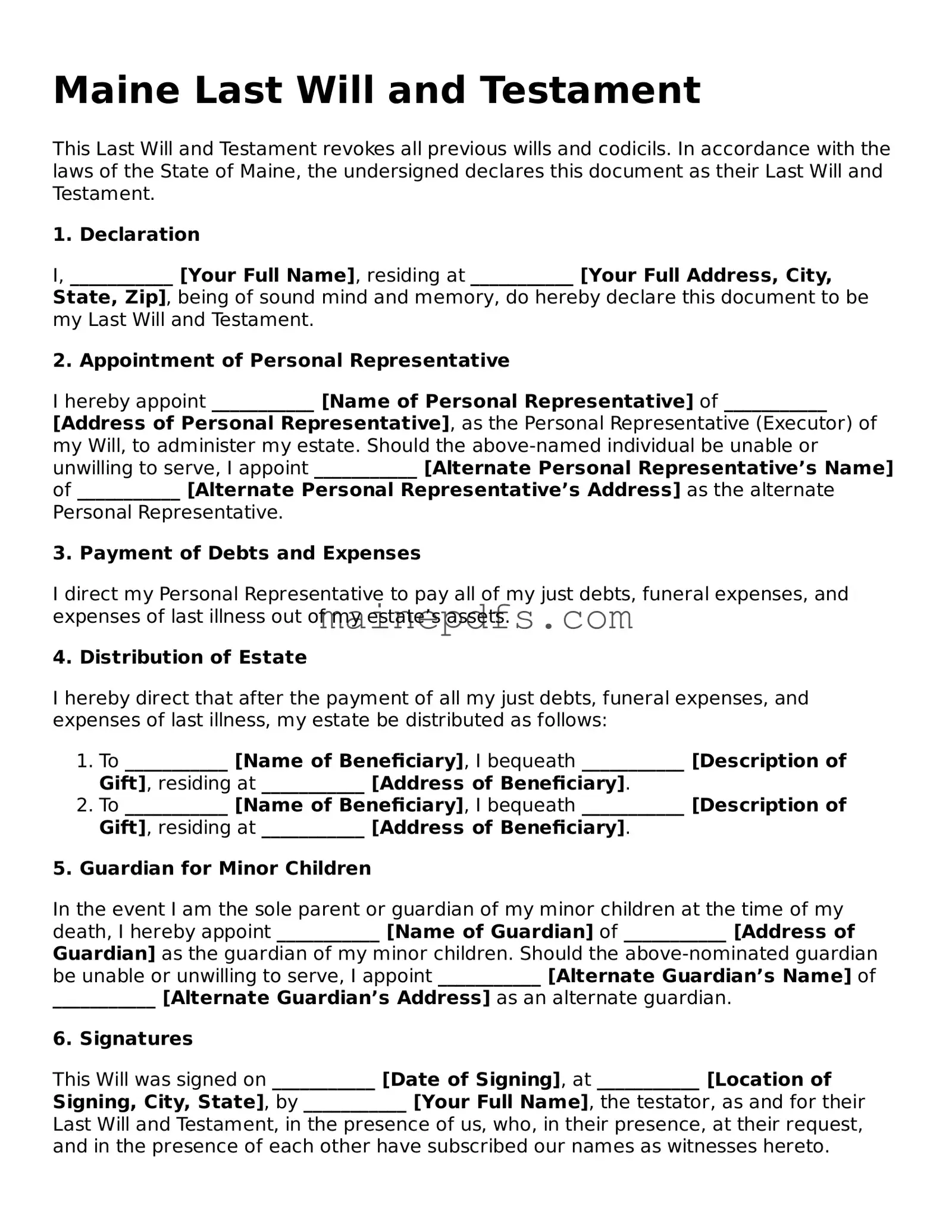Maine Last Will and Testament
This Last Will and Testament revokes all previous wills and codicils. In accordance with the laws of the State of Maine, the undersigned declares this document as their Last Will and Testament.
1. Declaration
I, ___________ [Your Full Name], residing at ___________ [Your Full Address, City, State, Zip], being of sound mind and memory, do hereby declare this document to be my Last Will and Testament.
2. Appointment of Personal Representative
I hereby appoint ___________ [Name of Personal Representative] of ___________ [Address of Personal Representative], as the Personal Representative (Executor) of my Will, to administer my estate. Should the above-named individual be unable or unwilling to serve, I appoint ___________ [Alternate Personal Representative’s Name] of ___________ [Alternate Personal Representative’s Address] as the alternate Personal Representative.
3. Payment of Debts and Expenses
I direct my Personal Representative to pay all of my just debts, funeral expenses, and expenses of last illness out of my estate’s assets.
4. Distribution of Estate
I hereby direct that after the payment of all my just debts, funeral expenses, and expenses of last illness, my estate be distributed as follows:
- To ___________ [Name of Beneficiary], I bequeath ___________ [Description of Gift], residing at ___________ [Address of Beneficiary].
- To ___________ [Name of Beneficiary], I bequeath ___________ [Description of Gift], residing at ___________ [Address of Beneficiary].
5. Guardian for Minor Children
In the event I am the sole parent or guardian of my minor children at the time of my death, I hereby appoint ___________ [Name of Guardian] of ___________ [Address of Guardian] as the guardian of my minor children. Should the above-nominated guardian be unable or unwilling to serve, I appoint ___________ [Alternate Guardian’s Name] of ___________ [Alternate Guardian’s Address] as an alternate guardian.
6. Signatures
This Will was signed on ___________ [Date of Signing], at ___________ [Location of Signing, City, State], by ___________ [Your Full Name], the testator, as and for their Last Will and Testament, in the presence of us, who, in their presence, at their request, and in the presence of each other have subscribed our names as witnesses hereto.
Witnesses:
- Witness Name: ___________ [Witness Name], Address: ___________ [Witness Address], Signature: ___________ [Signature], Date: ___________ [Date]
- Witness Name: ___________ [Witness Name], Address: ___________ [Witness Address], Signature: ___________ [Signature], Date: ___________ [Date]
Personal Representative’s signature:
I, ___________ [Name of Personal Representative], agree to act as the Personal Representative of ___________ [Your Full Name]’s estate.
Signature: ___________ [Signature], Date: ___________ [Date]
Alternate Personal Representative’s signature:
I, ___________ [Name of Alternate Personal Representative], agree to act as the Alternate Personal Representative of ___________ [Your Full Name]’s estate, should the primary Personal Representative be unable to serve.
Signature: ___________ [Signature], Date: ___________ [Date]

